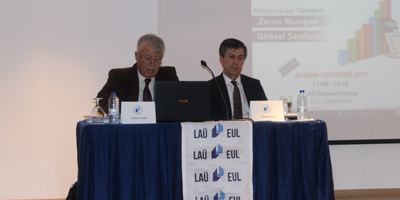Conference themed “Tax Justice and TRNC Tax Applications” held at EUL

European University of Lefke Faculty of Economics and Administrative Sciences Economy Department organized a conference themed “Tax Fairness and Taxation in TRNC”. Old Finance Minister Zenan Mungan, old Tax Office Manager and Certified Public Accountant Göksel Saydam attended the conference as speakers.
Saydam pointed out that tax is an indictment of independence of a country and said that; “As TRNC we have a tax law”. Saydam collected Cyprus’s tax history under four headings, and stated that the first of these was the period of the Ottoman Empire, a period which lasted about four centuries between 1571 and 1878.
Saydam: The main taxes applied by the Ottoman Empire;
- 1. Ashar (Tithe) Tax: Tax taken from Muslims farmers applied to agricultural output, taking a proportion.
- 2. Cattle Tax: Tax applied to each ovine.
- 3. Cizye Tax: Tax taken from the non-Muslims living in the Ottoman lands for their protection.
- 4. Muvafakat Tax: Tax obtained from foundation assets.
Saydam said that second period of the tax history of Cyprus is the period which lasts until the foundation of Republic of Cyprus. Saydam said that in 1878 the Ottoman Empire ceded the island to Britain and that after the First World War the British took Cyprus, and pointed out that after taking the island from Ottoman Empire, British put the taxation system of the Otttoman aside and started applying extenuated version of the taxes that they applied on European Countries. Saydam said that with the establishment of the Republic of Cyprus in 1960, the two communal parliaments, the Greek congregation and the Turkish congregation were established in the Constitution of the Republic of Cyprus and pointed out that two congregations were authorized to apply income tax. Saydam said that in the Republic of Cyprus, there were also tax laws on foreigners.
Saydam stressed that after 1968, the tax office was set up separately, one on the Greek side and one on the Turkish side and that after the 1974 Peace Operation, the main tax practice in Cyprus was started according to economic plans. Pointing out that 61 numbered taxation law of Turkish congregation was applied in Cyprus until 1982 Saydam said that instead of the outdated law of the 60’s, the new law was approved in 1982, which is still used today.
Mungan: “Direct tax is a kind of tax with specific ratepayer and which is received directly, and indirect tax is a kind of tax with unspecific ratepayer and which is received over assets”
Mungan said that tax justice is a phenomenon that determines the participation of the society to the public services in real terms. Mungan pointed out that the basis of tax justice is that it is essential for people with the same income level to pay the same amount of tax, while those with a high income level pay taxes at a high level.
Mungan stated that the tax payment and taxing authority are enshrined in the constitution in every country and added that a similar arrangement is also in the Constitution of the TRNC. Mungan pointed out that taxation in the TRNC is collected under two main headings, which are indirect and direct taxes and added that “Direct tax is a kind of tax with specific ratepayer and which is received directly, and indirect tax is a kind of tax with unspecific ratepayer and which is received over assets”.
Both speakers expressed their views on Local Improvement Tax which is on the agenda for creating resources for the Immovable Property Commission and how it could be implemented in terms of tax justice.
At the end of the panel, Dean of Faculty of Economics and Administrative Sciences Prof. Dr. Okan Veli Şafaklı and Head of Economy Department Assistant Professor Fehiman Eminer presented certificate of appreciation to the speakers.
